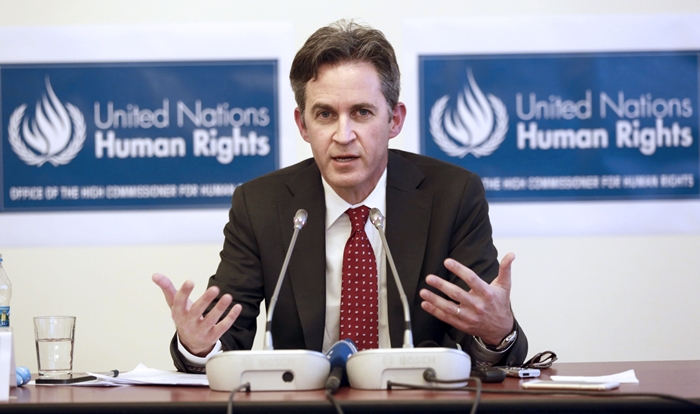United Nations Special Rapporteur David Kaye has called on the Turkish government to release all journalists currently in jail, warning Ankara that the need to react after a failed coup in July was not a “blank check.”
“The conclusions I would say are fairly grim and reflect what I think is a deep sense of restriction on freedom of opinion and expression throughout the country,” Kaye, the UN special rapporteur on the right to freedom of opinion and expression, told reporters in Ankara at the end of a weeklong visit.
Recalling that 155 journalists are in custody, Kaye urged the government to review its broad antiterrorism law, repeal its defamation laws that criminalize insults of government officials, reverse its shutdown of media outlets and allow people who were dismissed from government jobs to legally challenge the decisions.
During his mission to Turkey, Kaye met with government officials as well as a number of journalists in prison.
Reporters Without Borders (RSF), a Paris-based international non-profit, nongovernmental organization that promotes and defends freedom of the press, included Turkey’s President Recep Tayyip Erdoğan on its list of leading press freedom predators in a report released at the beginning of November.
According to Turkish media organizations, over 150 media outlets in Turkey were closed down, 866 journalists fired from their jobs and 620 journalists had their press cards canceled in past months over alleged links to the failed coup on July 15, which claimed the lives of more than 240 people.
Immediately after the putsch, the government along with President Erdoğan pinned the blame on the Gülen movement. Despite Turkish Islamic scholar Fethullah Gülen, whose views inspired the movement, and the movement having denied the accusation, Erdoğan — calling the coup attempt “a gift from God” — and the government launched a widespread purge aimed at cleansing sympathizers of the movement from within state institutions, dehumanizing its popular figures and putting them in custody.
More than 110,000 people have been purged from state bodies, in excess of 80,000 detained and over 36,000 have been arrested since the coup attempt. Arrestees include journalists, judges, prosecutors, police and military officers, academics, governors and even a comedian.



